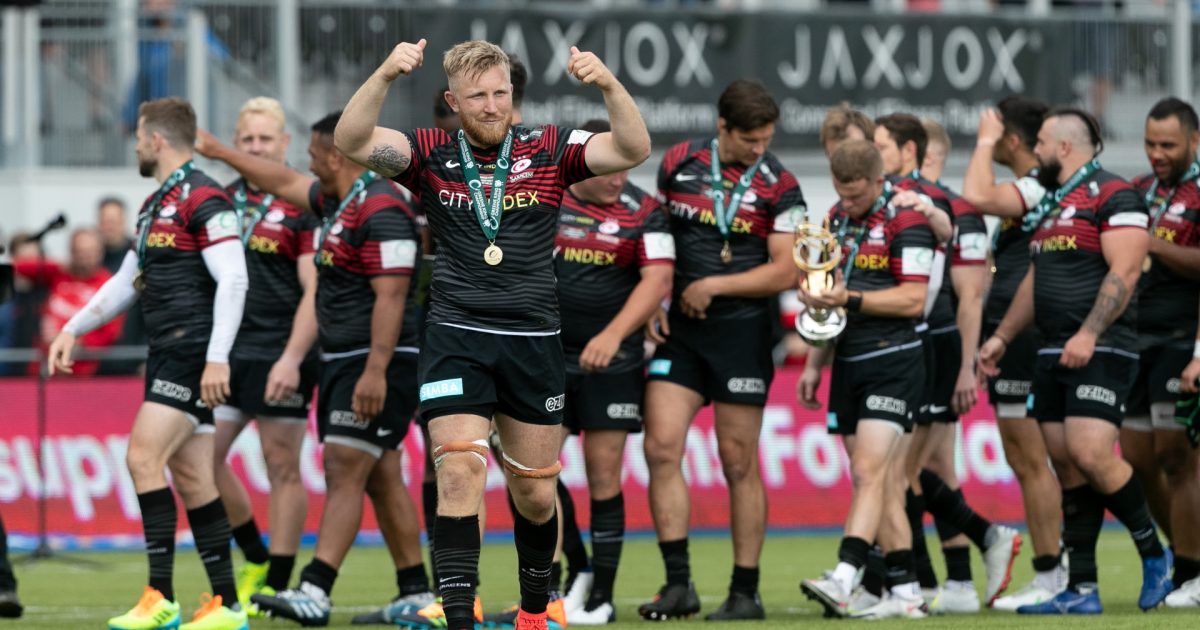Wray: The training ground change that was the making of Saracens

Jackson Wray will play his last professional match this Saturday when he lines out as the Saracens No8 in the latest Gallagher Premiership final at Twickenham. The fixture will bring the curtain down on a stellar club career that has featured titles galore, but the 32-year-old found time in the build-up to reveal how a training ground change-up ages ago became the making of the modern-day force that the London club now is.
The veteran forward is one of a number of long-serving Saracens staff to appear in the third and final episode of the Gallagher Making the Right Call video series that takes a closer look at the key decisions that shaped iconic Gallagher Premiership Rugby title-winning seasons.
In it, he casts his mind back to his teenage life at the club and how one simple change transformed Saracens’ culture. “We used to train as an academy group only, so we never had any exposure to the first team,” he said.
“And then as I turned 18, that changed, so basically we trained as one unit. So you got a lot more exposure early on. It just accelerates your learning, which is why they keep it the way it is now. Anyone that comes in now trains straight away with the first team.”
Assistant coaches Dan Vickers and Joe Shaw love the dynamic this approach has brought. “Mixing senior with the younger players is very effective,” vouched kicking coach Vickers.
Uncover how a Pivotal organisational change by @Saracens in 2008 propelled them to become one of the most successful teams in #GallagherPrem history.
Don’t miss the final episode of #MakingTheRightCall!
OUT NOW ?https://t.co/mahBfz0CC3 pic.twitter.com/kgRKaWIdYS
— Gallagher UK (@GallagherUK) May 26, 2023
Head coach Shaw added: “The impact that the senior players make, the effort to bring through the youth, I don’t think there is anything more powerful than having an older peer take you under the wing and spend real time with you talking about the feel of a game.”
Nick Isiekwe was cut from the same Wray cloth in terms of his own emergence at Saracens. “George Kruis, Jim Hamilton when they were here, Maro Itoje – those guys were massive and they just showed me the ropes and showed me what it meant to be a young player and how to prepare, because it was obviously a big step up from schoolboy to play in fully fledged professional rugby.
“That is what Saracens do exceptionally well, that players, especially when they are making their debuts, their first games, it’s open. The senior players are open to giving that kind of information, giving that feedback.”
Back to Wray: “How we prepare for the high-intensity environments has evolved quite a bit. Early on, we wouldn’t probably do as hard a training as we do now. But as the game has evolved and changed, we now have to.
“And how you react to decisions, react to mistakes, react to the opposition doing something new, been being able to evolve with the game and keep pushing and work harder than everyone else.”
It was 2019 when Saracens last won the Gallagher Premiership title, overwhelming Exeter with a stunning comeback in a Twickenham final of rich entertainment. Wray attributed the manner of that success to what goes on at the training ground.
“The depth of that belief and training gives you the opportunity to actually overcome anything. And the things I remember about that final was we were actually down quite a bit, you know, under the poles. Obviously, Owen (Farrell) was pretty clear on what we needed to do.”
“Exeter probably thought that they had us,” added Sean Maitland about that final four years ago. “The self-belief in that squad, that 2019 squad, was just humongous. We always had that self-belief that we can come back, you know, that the game wasn’t over.”



























































































